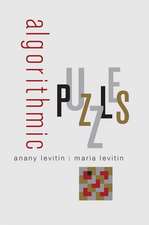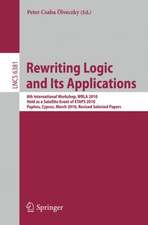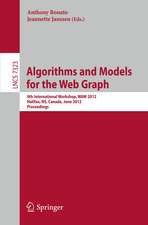Object-Oriented Behavioral Specifications: The Springer International Series in Engineering and Computer Science, cartea 371
Editat de Haim Kilov, William Harveyen Limba Engleză Paperback – 7 mar 2013
The papers in this book show various ways of designing elegant and clear specifications which are reusable, lead to savings of intellectual effort, time, and money, and which contribute to the reliability of software and systems.
Object-Oriented Behavioral Specifications offers a fresh treatment of the object-oriented paradigm by examining the limitations of traditional OO methodologies and by describing the significance of competing trends in OO modeling. The book builds on four years of successful OOPSLA workshops (1991-1995) on behavior semantics.
This book deals with precise specifications of `what' is accomplished by the business and `what' is to be done by a system. The book includes descriptions of successful use of abstract and precise specification in industry. It draws on the experience of experts from industrial and academic settings and benefits from international participation. Collective behavior, neglected in some treatment of the OO paradigm, is addressed explicitly in this book. The book does not take `reuse' of specifications or software for granted, but furnishes a foundation for taking as rigorous an approach to reuse decisions as to precise specifications in original developments.
| Toate formatele și edițiile | Preț | Express |
|---|---|---|
| Paperback (1) | 981.69 lei 6-8 săpt. | |
| Springer Us – 7 mar 2013 | 981.69 lei 6-8 săpt. | |
| Hardback (1) | 987.90 lei 6-8 săpt. | |
| Springer Us – 30 sep 1996 | 987.90 lei 6-8 săpt. |
Din seria The Springer International Series in Engineering and Computer Science
-
 Preț: 119.98 lei
Preț: 119.98 lei - 24%
 Preț: 1041.97 lei
Preț: 1041.97 lei - 20%
 Preț: 422.81 lei
Preț: 422.81 lei -
 Preț: 206.36 lei
Preț: 206.36 lei - 20%
 Preț: 313.26 lei
Preț: 313.26 lei - 20%
 Preț: 638.76 lei
Preț: 638.76 lei - 18%
 Preț: 1216.57 lei
Preț: 1216.57 lei - 18%
 Preț: 965.02 lei
Preț: 965.02 lei - 20%
 Preț: 641.36 lei
Preț: 641.36 lei - 18%
 Preț: 941.79 lei
Preț: 941.79 lei - 20%
 Preț: 641.87 lei
Preț: 641.87 lei - 15%
 Preț: 632.77 lei
Preț: 632.77 lei - 20%
 Preț: 639.09 lei
Preț: 639.09 lei - 18%
 Preț: 942.24 lei
Preț: 942.24 lei - 20%
 Preț: 639.72 lei
Preț: 639.72 lei - 20%
 Preț: 994.92 lei
Preț: 994.92 lei - 20%
 Preț: 641.21 lei
Preț: 641.21 lei - 18%
 Preț: 939.89 lei
Preț: 939.89 lei - 20%
 Preț: 995.57 lei
Preț: 995.57 lei - 18%
 Preț: 949.94 lei
Preț: 949.94 lei - 20%
 Preț: 640.23 lei
Preț: 640.23 lei - 15%
 Preț: 644.75 lei
Preț: 644.75 lei - 18%
 Preț: 943.20 lei
Preț: 943.20 lei - 18%
 Preț: 1212.36 lei
Preț: 1212.36 lei - 18%
 Preț: 950.57 lei
Preț: 950.57 lei - 15%
 Preț: 639.24 lei
Preț: 639.24 lei - 18%
 Preț: 941.47 lei
Preț: 941.47 lei - 18%
 Preț: 940.38 lei
Preț: 940.38 lei - 20%
 Preț: 1275.16 lei
Preț: 1275.16 lei
Preț: 981.69 lei
Preț vechi: 1227.11 lei
-20% Nou
Puncte Express: 1473
Preț estimativ în valută:
187.93€ • 193.71$ • 158.45£
187.93€ • 193.71$ • 158.45£
Carte tipărită la comandă
Livrare economică 27 februarie-13 martie
Preluare comenzi: 021 569.72.76
Specificații
ISBN-13: 9781475770407
ISBN-10: 1475770405
Pagini: 336
Ilustrații: XIV, 316 p.
Dimensiuni: 155 x 235 x 18 mm
Greutate: 0.47 kg
Ediția:Softcover reprint of the original 1st ed. 1996
Editura: Springer Us
Colecția Springer
Seria The Springer International Series in Engineering and Computer Science
Locul publicării:New York, NY, United States
ISBN-10: 1475770405
Pagini: 336
Ilustrații: XIV, 316 p.
Dimensiuni: 155 x 235 x 18 mm
Greutate: 0.47 kg
Ediția:Softcover reprint of the original 1st ed. 1996
Editura: Springer Us
Colecția Springer
Seria The Springer International Series in Engineering and Computer Science
Locul publicării:New York, NY, United States
Public țintă
ResearchCuprins
Exactness and Clarity in a Component-Based Specification Language.- A Formal Basis for Specifying Object Behaviour.- Information Refraction.- A Pragmatic Approach to Formal Specification.- Anecdotes About Making a Specification Simpler.- Invariants in the Trenches.- Fundamentals of Object-Oriented Specification and Modeling of Collective Behaviors.- An Overview of Larch/C++: Behavioral Specifications for C++ Modules.- Structural Active-Object Systems Fundamentals.- Organizational Culture: An Object-Oriented Framework.- Specifying and Reasoning about Business Rules in a Semantic Network.- Dynamic and Multiple Classification.- Specifying Business Policy Using Agent-Contract Meta-Constructs.- Architectural Specifications: Modeling and Structuring Behavior Through Rules.- The Search for the Linking Invariant: Behavioral Modeling Versus Modeling Behavior.- Automata Describing Object Behavior.- Enterprise Modeling with USE Cases.- Formal Object-Oriented Method — Foom.
























